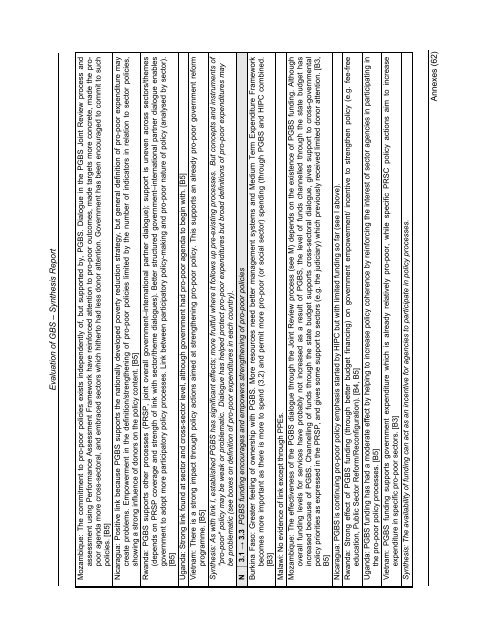Evaluation of General Budget Support: Synthesis Report - Belgium
Evaluation of General Budget Support: Synthesis Report - Belgium
Evaluation of General Budget Support: Synthesis Report - Belgium
Create successful ePaper yourself
Turn your PDF publications into a flip-book with our unique Google optimized e-Paper software.
<strong>Evaluation</strong> <strong>of</strong> GBS – <strong>Synthesis</strong> <strong>Report</strong><br />
Mozambique: The commitment to pro-poor policies exists independently <strong>of</strong>, but supported by, PGBS. Dialogue in the PGBS Joint Review process and<br />
assessment using Performance Assessment Framework have reinforced attention to pro-poor outcomes, made targets more concrete, made the propoor<br />
agenda more cross-sectoral, and embraced sectors which hitherto had less donor attention. Government has been encouraged to commit to such<br />
policies. [B5]<br />
Nicaragua: Positive link because PGBS supports the nationally developed poverty reduction strategy, but general definition <strong>of</strong> pro-poor expenditure may<br />
create problems. Empowerment in the definition/strengthening <strong>of</strong> pro-poor policies limited by the number <strong>of</strong> indicators in relation to sector policies,<br />
showing a strong influence <strong>of</strong> donors on the policy content. [B5]<br />
Rwanda: PGBS supports other processes (PRSP, joint overall government–international partner dialogue); support is uneven across sectors/themes<br />
(depends on PRSP coverage and strength <strong>of</strong> link with sector/theme dialogues). Better structured government–international partner dialogue enables<br />
government to adopt more participatory policy processes. Link between participatory policy-making and pro-poor nature <strong>of</strong> policy (analysed by sector).<br />
[B5]<br />
Uganda: Strong link found at sector and cross-sector level, although government had pro-poor agenda to begin with. [B5]<br />
Vietnam: There is a strong impact through policy actions aimed at strengthening pro-poor policy. This supports an already pro-poor government reform<br />
programme. [B5]<br />
<strong>Synthesis</strong>: As with link I, established PGBS has significant effects; more fruitful where it follows up pre-existing processes. But concepts and instruments <strong>of</strong><br />
"pro-poor" policy may be weak or problematic. Dialogue has helped protect pro-poor expenditures but broad definitions <strong>of</strong> pro-poor expenditures may<br />
be problematic (see boxes on definition <strong>of</strong> pro-poor expenditures in each country).<br />
N 3.1 → 3.3 PGBS funding encourages and empowers strengthening <strong>of</strong> pro-poor policies<br />
Burkina Faso: Greater feeling <strong>of</strong> ownership with PGBS. More resources need better management systems and Medium Term Expenditure Framework<br />
becomes more important as there is more to spend (3.2) and permit more pro-poor (or social sector) spending (through PGBS and HIPC combined.<br />
[B3]<br />
Malawi: No evidence <strong>of</strong> link except through PPEs.<br />
Mozambique: The effectiveness <strong>of</strong> the PGBS dialogue through the Joint Review process (see M) depends on the existence <strong>of</strong> PGBS funding. Although<br />
overall funding levels for services have probably not increased as a result <strong>of</strong> PGBS, the level <strong>of</strong> funds channelled through the state budget has<br />
increased because <strong>of</strong> PGBS. Channelling <strong>of</strong> funds through the state budget supports cross-sectoral dialogue, gives support to cross-governmental<br />
policy priorities as expressed in the PRSP, and gives some support to sectors (e.g. the judiciary) which previously received limited donor attention. [B3,<br />
B5]<br />
Nicaragua: PGBS is continuing pro-poor policy emphasis started by HIPC but with limited funding so far (see I above).<br />
Rwanda: Strong effect <strong>of</strong> PGBS funding (through better budget financing) on government empowerment/ incentive to strengthen policy (e.g. fee-free<br />
education, Public Sector Reform/Reconfiguration). [B4, B5]<br />
Uganda: PGBS funding has had a moderate effect by helping to increase policy coherence by reinforcing the interest <strong>of</strong> sector agencies in participating in<br />
the pro-poor policy processes. [B5]<br />
Vietnam: PGBS funding supports government expenditure which is already relatively pro-poor, while specific PRSC policy actions aim to increase<br />
expenditure in specific pro-poor sectors. [B3]<br />
<strong>Synthesis</strong>: The availability <strong>of</strong> funding can act as an incentive for agencies to participate in policy processes.<br />
Annexes (62)

















